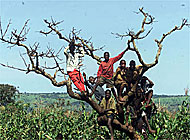Lausanne University agrees to settle “biopiracy” case

The University of Lausanne has agreed to renegotiate a controversial agreement over the use of Zimbabwe's medicinal and poisonous plants. The agreement follows mounting criticism of a patent for a potential fungicide compound, which was granted to a professor at Lausanne University.
The decision to renegotiate the patent came at a highly charged meeting in Zimbabwe between the Universities of Zimbabwe and Lausanne, as well as the Environment Ministry and the Zimbabwe Traditional Healers Association.
Participants agreed that the patent held by the University of Lausanne, as well as the current agreement on access and benefit sharing, were legally unacceptable.
Zimbabwean and Swiss non-governmental organisations have repeatedly accused the university of “biopiracy” – charges denied by Professor Kurt Hostettmann, director of the Institute of Pharmacognosy and Phytochemistry.
In 1995, the universities of Lausanne and Zimbabwe signed a research agreement on plants, which stipulated that a joint application would be made for any patent filed. Lausanne ignored the provision and proceeded to file a patent on its own for the anti-fungal properties of the plant, Swartzia madagascariensis.
Francois Meienberg, spokesman for a Swiss non-governmental organisation, the Berne Declaration, who also attended last week’s meeting in Zimbabwe, says the agreement was totally unsatisfactory.
“Both universities made a mistake when they signed this contract,” he told swissinfo. “The University of Zimbabwe is not allowed to give access to the country’s genetic resources. Under the Convention on Biological Diversity, the Zimbabwean government is the only body which can grant access.”
Meienberg said the case was proof that the illegal appropriation of biological resources from developing countries was still common practice by northern universities and corporations.
“It is clear that universities go into countries where the state is not organised in this respect and try to find a loophole.”
The Berne Declaration wants the Zimbabwean Ministry of Environment and Tourism to draw up clear rules for bio-prospectors to ensure that any benefits are not monopolised.
Meanwhile, the Lausanne professor, Hostettmann, has vigorously denied charges of biopiracy: “By making an agreement including the University of Zimbabwe, our aim was not to exploit Zimbabwe.”
Hostettmann said he had been investigating the potential as a fungicide of the root bark of swartzia madagascariensis as far back as 1990 when he had no contact with Zimbabwe, and that by 1994, he had already been able to isolate the active constituent. He said the samples gathered in Zimbabwe confirmed what he had already discovered.
Ironically, the United States pharmaceutical company, Phytera, which was developing the compound, has stopped its research because of toxicity problems.
Hostettmann says he hopes to continue collaboration with the University of Zimbabwe under a new agreement which would include other partners like the government and traditional healers.
“The Rio Convention on Biological Diversity must of course be respected,” he said. “But it is not clear in many countries who the official partner should be. We agree entirely with NGOs that precise guidelines should be established urgently.”
by Vincent Landon

In compliance with the JTI standards
More: SWI swissinfo.ch certified by the Journalism Trust Initiative
You can find an overview of ongoing debates with our journalists here. Please join us!
If you want to start a conversation about a topic raised in this article or want to report factual errors, email us at english@swissinfo.ch.